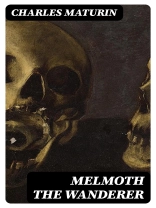In ‘Melmoth the Wanderer, ‘ Charles Maturin crafts a gothic tale that intricately explores themes of despair, existentialism, and the quest for meaning in a morally ambiguous world. The novel intertwines the story of Melmoth, a man who sells his soul for prolonged life, with a multitude of narratives that encapsulate a darker side of human nature, intensified by the romantic style of early 19th-century literature. Maturin employs richly descriptive language and an innovative narrative structure, employing multiple layers of storytelling that invite readers to confront the psychological torment that accompanies eternal life. Charles Maturin, an Irish author and clergyman, was deeply influenced by the socio-political climate of his time, particularly the struggles between faith and skepticism. His own experiences of personal despair and societal alienation found expression in this haunting narrative. Maturin belonged to the Irish literary revival era, and his interactions with contemporaries like Lord Byron and Samuel Taylor Coleridge likely shaped his outlook on the intersection of tragedy and the sublime. ‘Melmoth the Wanderer’ is highly recommended for readers who appreciate complex narratives that delve into the human condition. An essential work of gothic literature, it compels one to examine moral choice and the societal constraints of the era, marking it as a profound exploration of the human psyche that resonates deeply in both historical and contemporary contexts.
Despre autor
Charles Robert Maturin (1782–1824) was an Irish clergyman and a writer of Gothic plays and novels. His most renowned work is ‘Melmoth the Wanderer’ (1820), a convoluted tale that captivates with its narrative complexity and its exploration of themes such as guilt, isolation, and the human condition. Born in Dublin into a Huguenot family, Maturin’s heritage and personal history influenced his literary career, infusing his work with a deep sense of morality and introspection. Despite his professional life as a curate, literature was his true passion. Maturin’s Gothic writing style aligns him with contemporary Romantic authors, and he formed part of a literary circle that included names like Sir Walter Scott, who once referred to him as ‘a man of genius’ (Brown, 1896). Maturin’s works are marked by a dark and engaging prose, an affinity for the macabre, and a flair for the dramatic. His narrative prowess is fully evident in ‘Melmoth the Wanderer’, which, despite initial mixed reviews, has since been celebrated for its innovative storytelling and has influenced a range of writers from Honoré de Balzac to Oscar Wilde, Maturin’s own great-nephew. The novel’s impact on the Gothic genre and its lasting significance in the canon of 19th-century literature is undeniable. Today, Maturin is acknowledged not just as a significant Gothic novelist but also as a crucial bridge between the Romantic and Victorian literary traditions.












